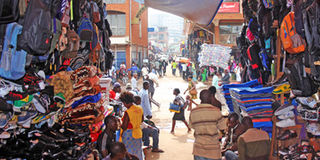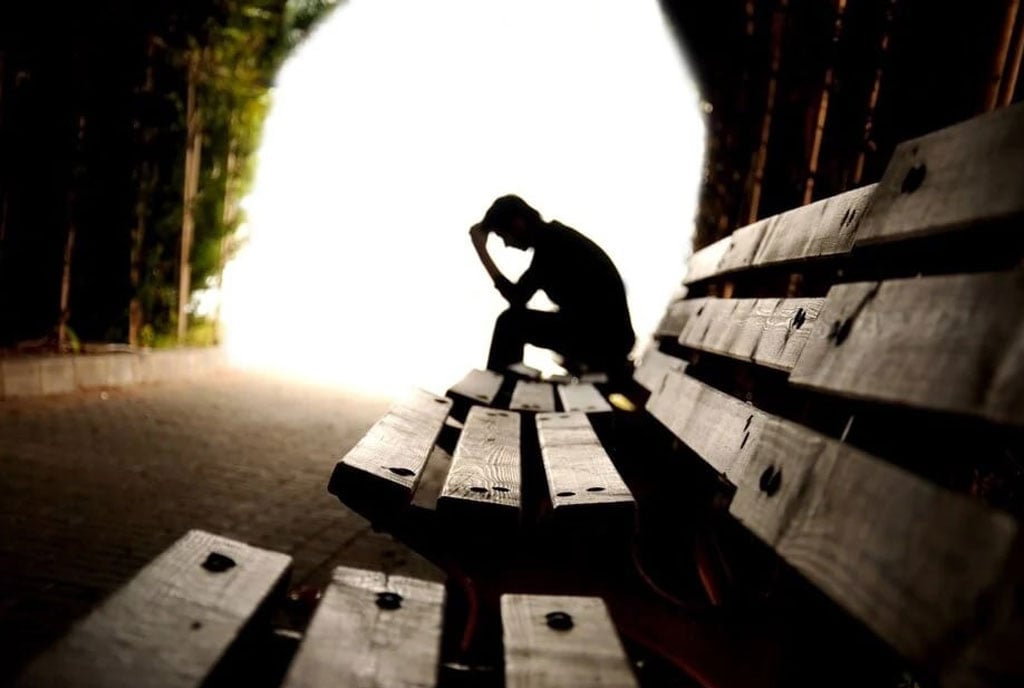Prime
Terror threats: Arcades, markets and parks most exposed spots

Busy areas like this shopping facility in downtown, Kampala, harbour the majority of city traders yet have the least or no security personnel. PHOTO by Abubaker Lubowa
With three years gone since the July 11 bombing and with many an effort to improve security at public venues, a mini-survey of public places in and around Kampala shows that entertainment venues, especially nightspots, have the most vigorous on-site checks, while crowded places like arcades and markets, remain unattended. Sunday Monitor’s Andrew Bagala & John K. Abimanyi went out into Kampala, testing the security at various venues and came up with varying results.
You will find a combination of metal detectors and on-the-body searches, for both men and women, at the entrance of most pubs and nightclubs in Kampala. At most arcades, however, especially in the commercial hub in downtown Kampala, there is neither a security guard nor metal detector in place to screen entrants.
We find ourselves in a scenario where venues of perceived value, say government offices and uptown locations, where public figures, the rich and upper middle classes are more likely to frequent, at least go as far as having a semblance of security checks on their locations. Venues that largely attract the middle to lower classes, however, for instance markets and downtown arcades, are left to fend for themselves.
While some measures have been taken in uptown areas like hotels and high-end supermarkets, the measures are not as effective and, often, are not utilised.
With the police agreeing that crowded areas in Kampala’s downtown business districts are a security risk that is almost impossible to address in its current form, it leaves room for a sense of uncertainty, on the safety of traders, commuters and consumers who frequent these areas.
Arcades, markets and parks
From the intersection where Namirembe Road meets Ben Kiwanuka Street, and stretching on westwards, a sea of people clatter your sight. They squeeze into any of the few spaces left by buzzing boda boda motorcycles and taxis that clog the roads. You then see the masses pushing and shoving at each other, as they enter and leave the arcades.
The sight from the outside, say at Skylight Shopping Arcade, is of a sort of conveyor belt, pouring forth streams of human traffic, while carrying others in. There are traders, some loud and cheery, calling for customers. There are consumers, desperately clutching onto their bags as they survey the merchandise on offer that lines the entrances, haggling for a discount.
There are porters, demanding that you clear the way, lest they strike you with the weighty load that they are carrying. Even KCCA law enforcement officers, in their yellow and green, make an appearance, darting their eyes around as they try to look busy.
But in this sea of people, the wide spread expanse of human activity, there was no security checkpoint on sight. No guards or police officers checking entrants into arcades where hundreds, if not thousands of people, haggled and traded. This was the case at all arcades in this stretch, from the Mukwano plaza to the left, to the jam-packed Kikuubo lane, on the right.
Farther on West, at St Balikuddembe (Owino) Market, the same scenario played out – large numbers of traders, hagglers, and porters carrying loads, walking in and out, through large un-attended gateways. Just like at the arcades, but more so at St Balikuddembe, nearly half the entire walkways leading into the market were filled by vendors and their merchandise.
It is very different from what security features existed at arcades on the high-end, up-scale suburbs in town. At Garden City, for instance, on Yusuf Lule Road, three guards stood at the main entrance, male and female, checking cars, even inside the trunk. They patted pedestrian entrants down as well. At Oasis Mall, still along Yusuf Lule Road, cars lining up along the entrance underwent checks too. Male and female guards were also positioned at pedestrian entry points.
But even if there were security guards at these two sites, their alertness and commitment was not consistent.
Often the guards left their stand posts, and took a rest at a bench or stool nearby, leaving entrants to freely walk in. This was at both shopping malls.
Other experiences at Oasis Mall show that at times the guards, even when keeping watch, will let an entrant pass without check, if they for instance do not look roguish, say if they are dressed in a shirt and tie.
Nakawa Market, the less populated centre of commerce on Jinja Road, was more complex as it had no specific entry slots. The southern side, along Jinja Road, is porous, allowing anybody entry into the market all across that length.
How about taxi parks? The same laissez faire procedure rules at the bus parks too, with checks only coming in place to exits, and these are only to search of licenses.
Ministries, hotels and night spots
After the July 11, 2010 terror attacks, police established barricades near the fence around the police headquarters that are intended to reduce the impact of the blast in case an explosive goes off in the area.
The Counter Terrorism unit too made sure that every morning before the police staff arrived in office, the officers from the Canine Unit brought sniffer dogs that are guided around the building to see that there are no explosives that are hidden in the building.
Walk-through metal detectors were also installed at entry points at the police headquarters and Kampala Metropolitan Police head offices. When people would visit the police offices, they would walk through the metal detectors after handing over their gadgets like phones and handbags for thorough checking.
The moment the metal detector would sense a metal on the body of the visitor and subsequently make an alarm, the person would be told to first remove the metal and pass through the equipment again until it has made no alarm. Everyone would be subjected to hand search.
Just a few years after the terror attack, such rigorous checks have remained only at Entebbe International Airport and a few embassies like the US and UK. At Entebbe International Airport, all visitors and clients are subjected to walkthroughs and their equipment is taken through the scanner.
Clients walk through the metal detectors walkthroughs without any metallic objects and shoes.
Apparently, the equipment at major police stations and public places has turned out to be just for formality than for finding out explosives and dangerous gadgets. And the hand search only exists at the entrance of night clubs and events.
Police headquarters
At the police headquarters, the guards manning the entrances rarely ask whether you are armed or not. Surprisingly, when you walk through the metal detectors with a mobile phone after putting the second one in the basket, no guard will subject such a visitor to another search even when the alarm has gone off. The guards, most of whom are in their advanced ages of service, are literally fixed on the chairs.
Other than the two main police stations no other police stations subjects its visitors to checks at the entrances.
Kampala Metropolitan police spokesperson Ibin Ssenkumbi attributes the laxity at police stations to the public and supervisors of the officers deployed at the entrances.
“The public has the responsibility to report officers who aren’t doing their work. If you enter a station and an officer just looks at you, know that his or her recklessness is putting your life in danger so report to the commanders. The challenge we get is that many people are cautious about their security,” Mr Ssenkumbi said.
At Parliament, a two-phase security check was in place. First, an entrant went through a pat-down check by police officers, at the entrance along the Said Barre Road, just opposite the National Theatre. This even included an interrogation as to what the intending entrant wished to do inside Parliament. Then there was another, complete with metal detectors, right at the entrance of the building.
At Development House, where the Ministry of Education offices, among other government offices are, entrants were submitted to checks where security guards also took down identification details of the visitors.
Most hotels have only walkthroughs but the private security guards. Interestingly, most night clubs even those at the low end are meeting the minimum standards.
Our visit at Dancers club at Kibuye, a Kampala suburb, a bouncer at the entrance made sure that each client was checked using a handheld metal detector and when it made an alarm, he would physically touch the object.
At Nyondo Club at Najjanankumbi on Entebbe Road, no client is allowed in the club unless he or she has been checked using a walk through metal detectors and hand search.
Police spokesperson Judith Nabakooba, said since the July 11 bombings, they have been able to build capacity to detect and fight terrorism. “Counter terrorism is best done by intelligence-led policing. These are some of the courses our officers were taken through during the Eastern Africa Police Chiefs Cooperation (EAPCCO) training at Mandela National Stadium at Namboole,” Ms Nabakooba said.
Uncertainty at arcades and markets
Mr Ssenkumbi says the way downtown Kampala’s commercial centres were built, in a disorganised way, makes the enforcement of security measures difficult.
“The biggest problem is the setup of those places. It is not suitable for these security measures,” he says.
He adds that a solution lies in the reconstruction of the bus parks and markets to allow for the creation of specific points of entry and exit. These would then be easy to subject to security checks. The police officer also blamed the management of these institutions, particularly parks and markets, which he says has been too divided to direct attention to establishment of security provisions.
And so as thousands of Ugandan commuters, and traders, and consumers packed together in a constricted area in the course of their business, wait for an improvement in infrastructure so as to have an improvement in security, the bad people who wish to do us harm do not have such restrictions.
From the past
On April 4, 1998, bombs exploded at Nile Grill and a café at Speke Hotel on Shimoni Road at least five people were killed and six others injured.
On Feb. 14, 1999, another bombs went off at Telex Bar in Kabalagala several people were injured.
On May 30, 1997, a bomb went off in Ange Noir discotheque several people were killed and injured.
On May 12, 2001, bombs went off in St. Balikuddembe Market formerly Owino Market as President Museveni was being sworn in for the second term.
In 2002, bombs that were reportedly planted by Allied Democratic Force (ADF) operatives in Kampala left a number of people killed while others survived with severe injuries.
In 2007, a bomb was hurled into a car killing three people, including Ex-Allied Democratic Force operative, at Nateete, a Kampala suburb.
The bomb blast forced President Yoweri Museveni to order the Inspector General of Police Kale Kayihura to recruit 1,000 Special Police Constables in the city centre to monitor road injunctions.




